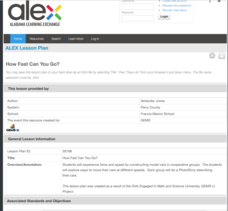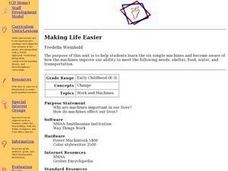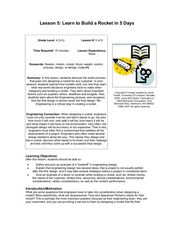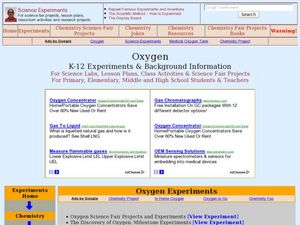Curated OER
Exercise and Water
Second graders discover the needs of their body by trying different types of aerobic exercise. In this physical education lesson, 2nd graders analyze The Busy Body Book by glancing at the pictures inside and predicting what the...
Curated OER
Magnets
Second graders classify objects and create hypotheses regarding their magnetic properties. They watch a video about magnets and finally use a magnet to test their hypotheses created earlier.
Curated OER
Understanding How Potatoes Grow
Second graders make a KWL chart and brainstorm what they need for the project of growing potatoes. They choose one potato and plant it in water or peat moss cups and choose a location in which meets the needs of the plants and make their...
Alabama Learning Exchange
How Fast Can You Go?
Learners investigate force and speed. In this physics instructional activity, students construct model cars in small groups and perform experiments to identify what factors influence speed and force.
Curated OER
Hatching Chickens
Students observe chicks hatching from eggs. In this science lesson, students view a video to develop an understanding of the proper care and needs of eggs and live animals. This is a great precursor activity for hatching eggs in class.
Curated OER
The Great Rock Sort
Students describe and sort rocks according to their physical properties. They listen to a story and discuss what they know about rocks, then work with a partner to discuss how their sample rocks differ from each other.
Curated OER
Making Life Easier
Students use a chart of the six simple machines and become aware of how the machines improve our ability to meet the following needs: shelter, food, water, and transportation. Students use model cars to experiment with force. They divide...
Curated OER
The Science of Swinging
Students learn how a pendulum works in the concept of an amusement park ride. In this pendulum lesson, students are introduced to Newton's first law of motion and how it works in an amusement park ride. Continuous motion and inertia are...
Curated OER
The Impact of the Physical Environment on Stream Macroinvertebrates
Young scholars explore the relationship between leaf packs in streams and macroinvertebrate populations. They experiment with hand exposure to stream macroinvertebrates in natural leaf packs and then make leaf packs of their own. The...
Curated OER
Motion and Force
This physics PowerPoint defines the concepts of motion and force. The slideshow consists of an explanation on how motion and force work and give students the chance to demonstrate motion and force through an experiment. The directions...
Curated OER
Children's Literature Across the Curriculum Ideas-The Gadget War
Students read The Gadget War by Betsy Duffey. They complete a variety of cross-curricular activities surrounding inventors and inventions. Included are reading, art, math, science, writing, social studies, and library connections.
Center for Learning in Action
Challenge with Solids, Liquids, and Gases
There's a container for every matter—liquid, solid, and gas. Pupils design three different containers, each with the capability to hold one of the states of matter, and share their design with the class.
Curated OER
What Do Magnets Do?
Second graders discover the physical properties of magnets. In this physics lesson, 2nd graders investigate the differences between natural and man made magnets and the uses of each. Students complete 4 separate RAFT...
Curated OER
Interesting Insects
Students discover the characteristics of insects. They explore insects through cooperative learning, group projects, hands on activities, and poetry. They gain knowledge of insect life cycles, habitat, and physical characteristics.
Curated OER
Learn to Build a Rocket in 5 Days
Students explore physics by participating in an engineering activity. In this rocket instructional activity, students define a list of scientific vocabulary terms such as "re-engineering" and "trade-off." Students identify the rocket...
Curated OER
Dinosaur Designs
Students study dinosaurs in science and conduct online research to gather written information about his or her dinosaur. Then, in art class, they sketch their dinosaur and create an accurate three-dimensional dinosaur model out of paper...
Curated OER
How We Use Rocks: Part 1
Second graders read books about rocks, observe rocks and locate a special rock to observe more closely. They complete a worksheet about the chosen rock and create an art project using rocks or pebbles.
Alabama Learning Exchange
This Is How We Roll!
Students research how roller coasters work. In this physics instructional activity, learners research the history of roller coasters and the safety factors in the design of a roller coaster on the website...
Curated OER
The Life Cycle of the Butterfly
Second graders study the life cycle of a butterfly by observing metamorphosis taking place in a butterfly pavilion. Students illustrate their understandings of the body parts of a caterpillar and butterfly, as well as the life cycle,...
Curated OER
Anatomy What Does the Heart Do?
Second graders identify the major parts of the heart and comprehend the basic function of the heart. They identify the heart in relation to other major structures in the body, including the lungs, brain, and stomach. Students identify...
Curated OER
Tin Can Stilt Walkers
Young scholars make tin can stilt walkers. In this stilt walkers lesson, students use 48 ounce size cans to make stilt walkers. They practice walking on them to improve their balance in this environmentally friendly art and physical...
Curated OER
Oxygen
Students explore oxygen and its physical and chemical propeties. In this investigative activity students complete several experiments using oxygen.
Curated OER
Where Do We Get Clean Water?
Students investigate the concept of a filter. They use simple supplies in order to construct one after watching a demonstration performed by the teacher. An important warning that the project water is not clean for drinking is included....
Curated OER
The Insect Files
Students are provided with a physical description of the insect, in words and graphics, including body parts, special adaptations, color, and so on. They explore and report on all four elements of an insect's habitat: food, water,...























